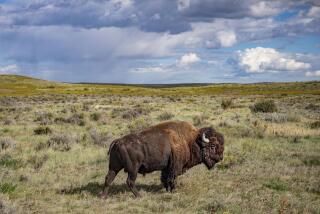TV REVIEWS : ‘Untold West’ Tells Old and New Stories
- Share via
The three-part “The Untold West,” which begins on cable station TBS tonight and continues Tuesday and Wednesday (at 5:05 p.m. and 8:05 p.m. each day), might also be called “The Oft-Told West” as it covers a lot of familiar ground while breaking some new ground of its own.
The series purports to be a documentary and anecdotal look at the Old West, and indeed it uses all the usual TV-documentary tools: archival photos and documents, interviews with historians and descendants of Western icons. But the series also makes extensive use of Western movie footage from the Turner film library to illustrate its points--and that gives the programs a small lift.
Tonight’s episode, “Outlaws, Rebels and Rogues,” focuses on the outlaw careers of Jesse James, Billy the Kid, Belle Starr, Butch Cassidy and the Sundance Kid. Most of the stories--the Northfield, Minn., raid, the Lincoln County War, “the Bandit Queen”--have been told many times before. But it takes interesting note of the synergistic relationship of the outlaws with the press of the time. Celebrated in the Eastern newspapers and dime novels, the outlaws staked a claim on the American imagination that exists to this day.
“The Black West,” Tuesday’s installment, retells the story of how blacks were involved in settling the frontier--many of them former slaves who escaped in the decade before the Civil War. Many blacks were cowboys; others found special niches in the West: York was a scout for Lewis and Clark; Jean Baptiste DuSable, a Paris-educated fur trader, established his trading post at what is now Chicago. And then there was Stagecoach Mary Fields, who rode for the Pony Express and drove a mail coach until she was 70.
Wednesday brings the somewhat lame “Hot on the Trail,” which purports to tell us about the “uniquely Western way of romancing.” Unfortunately, it seems more concerned with the prostitutes who serviced the cowboys than with the heroic efforts of the women--wives and mothers, mostly--who rode in the wagon trains that settled the West. It also leaps ahead to the present day to introduce us to “buckle bunnies,” the groupies of the rodeo circuit.
Ah, the Wild West, where men were men and . . . then there was Mrs. Noonan, a laundress with Custer’s 7th Cavalry who married and buried three horsemen until her death in 1878--when it was discovered that she was a he.
There’s a story that Mr. Noonan probably wishes remained untold.
More to Read
The complete guide to home viewing
Get Screen Gab for everything about the TV shows and streaming movies everyone’s talking about.
You may occasionally receive promotional content from the Los Angeles Times.






